仁爱版七年级下册Units 5-6复习课件
文档属性
| 名称 | 仁爱版七年级下册Units 5-6复习课件 | 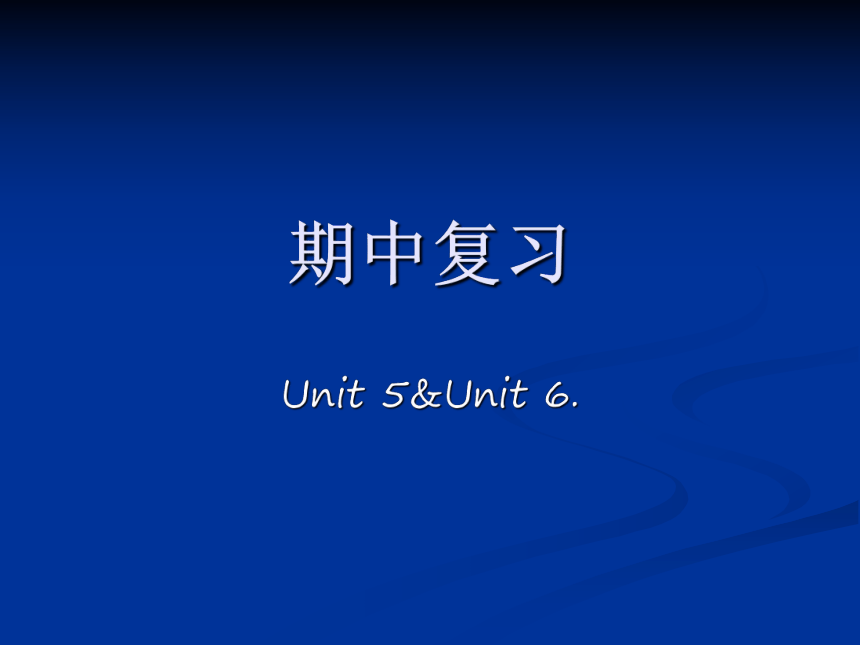 | |
| 格式 | zip | ||
| 文件大小 | 26.8KB | ||
| 资源类型 | 教案 | ||
| 版本资源 | 仁爱科普版 | ||
| 科目 | 英语 | ||
| 更新时间 | 2012-03-19 08:37:16 | ||
图片预览

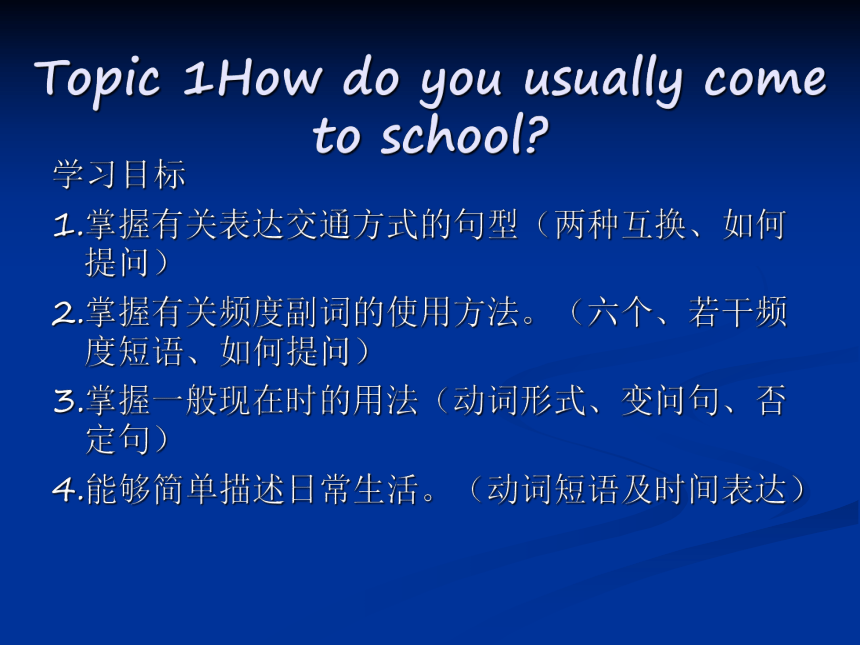
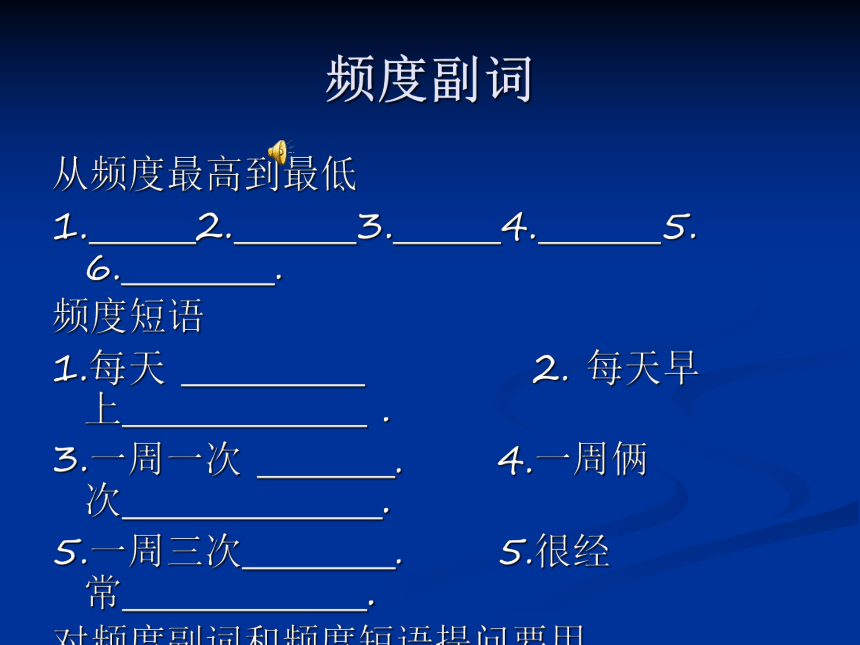
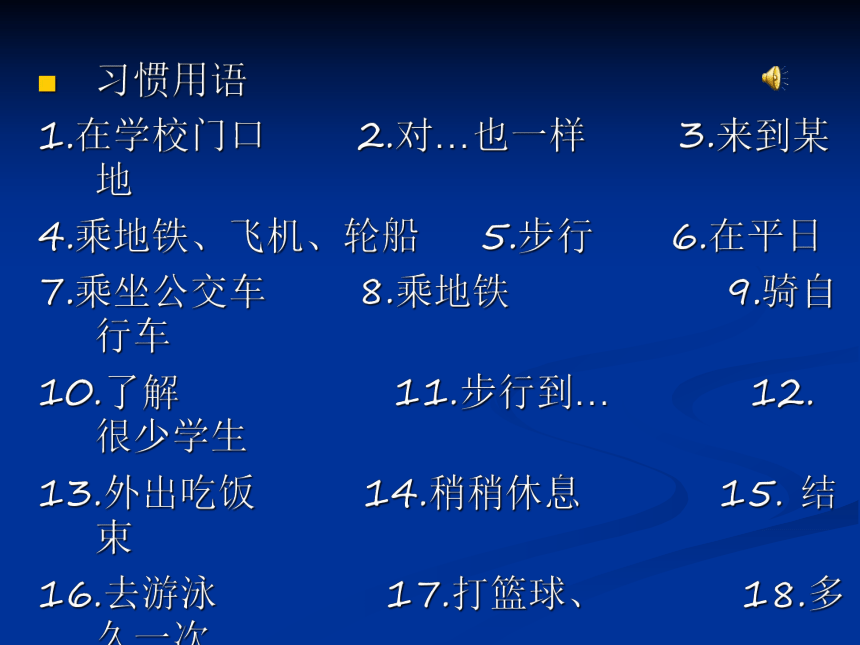
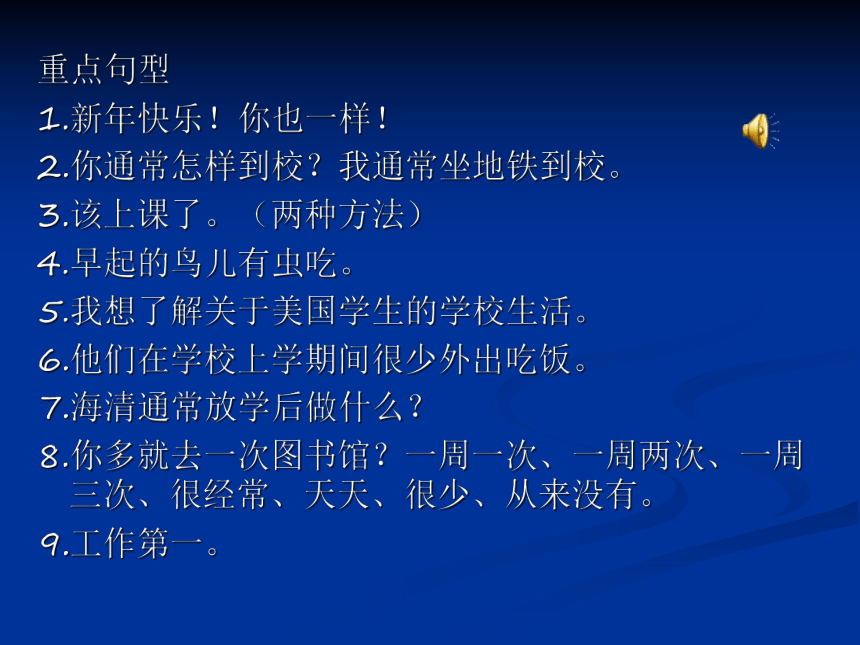
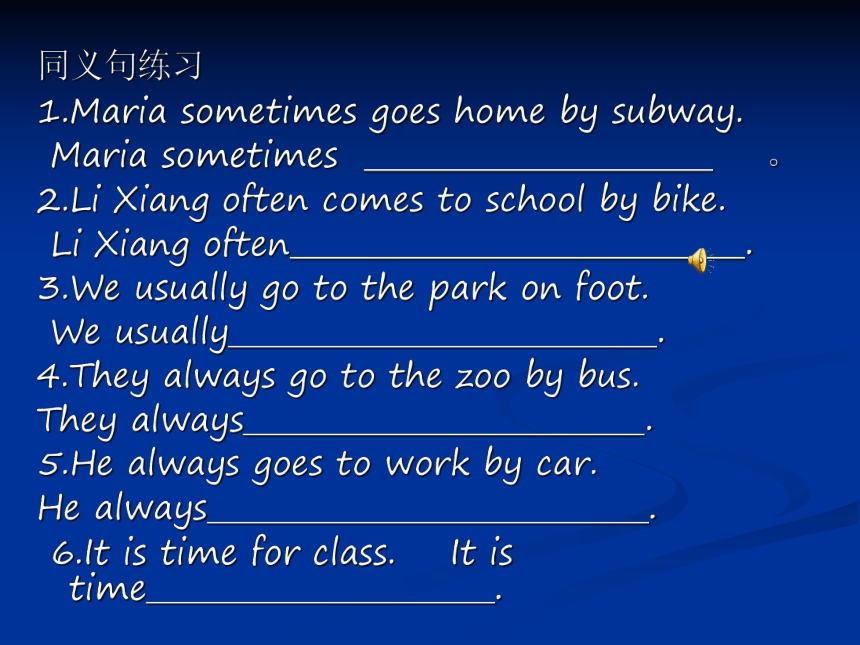
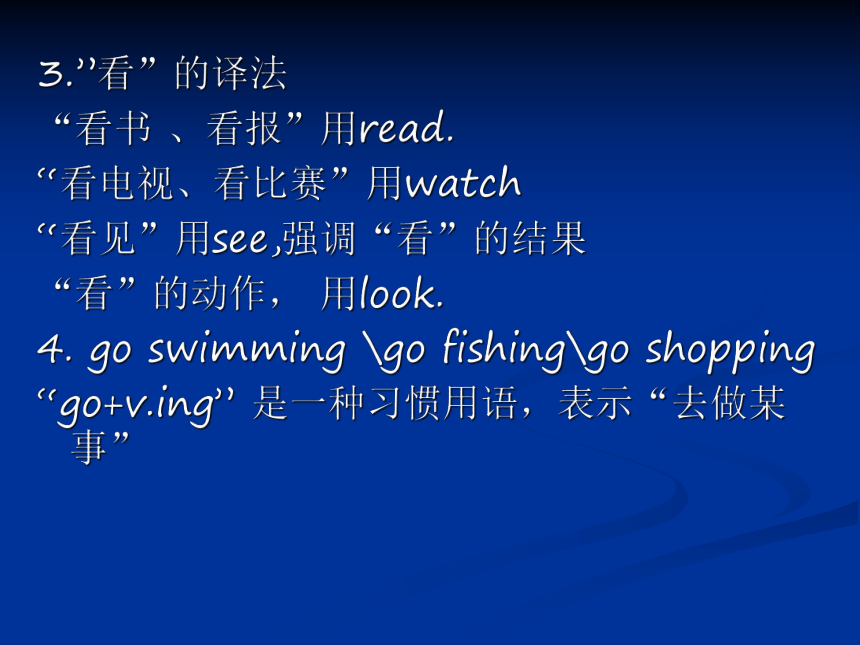
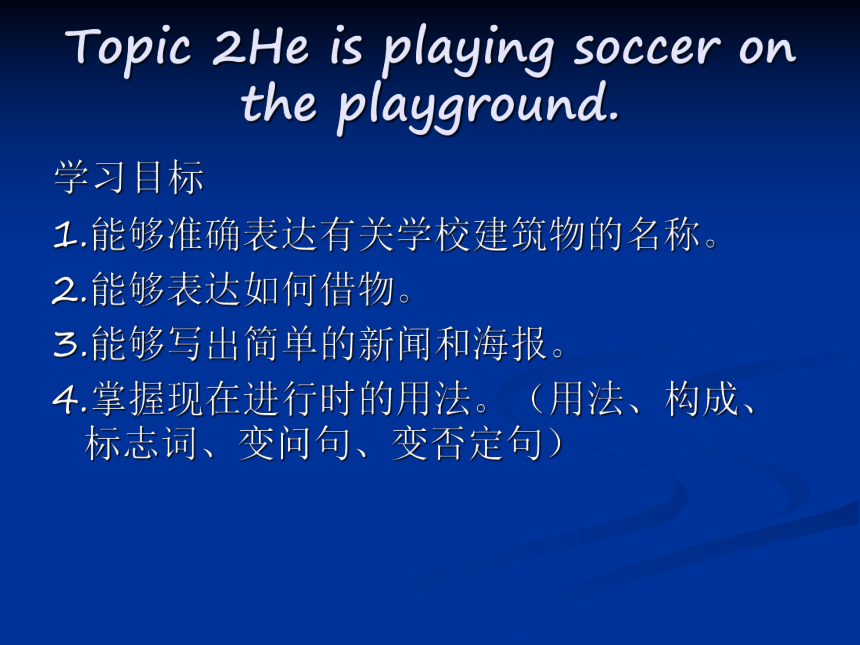
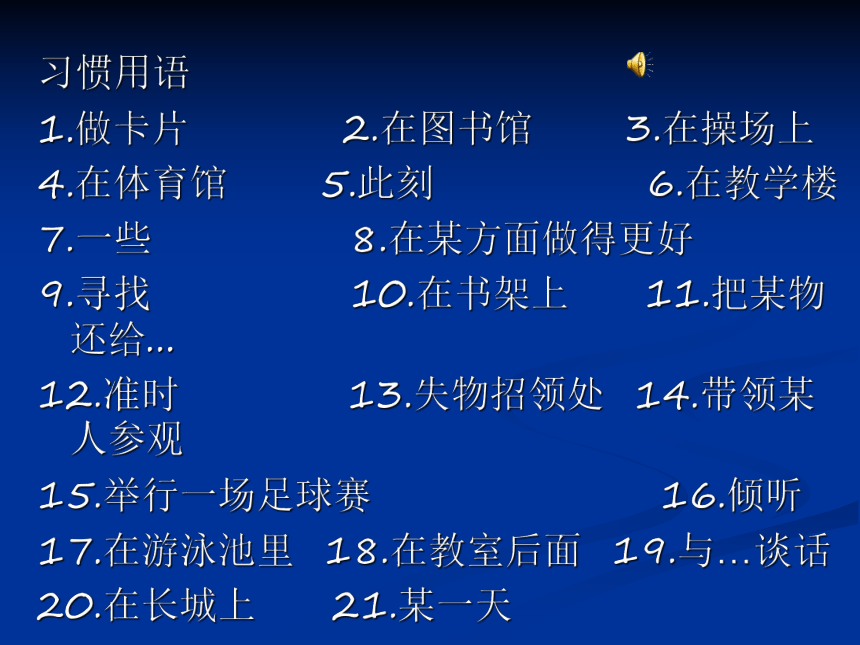
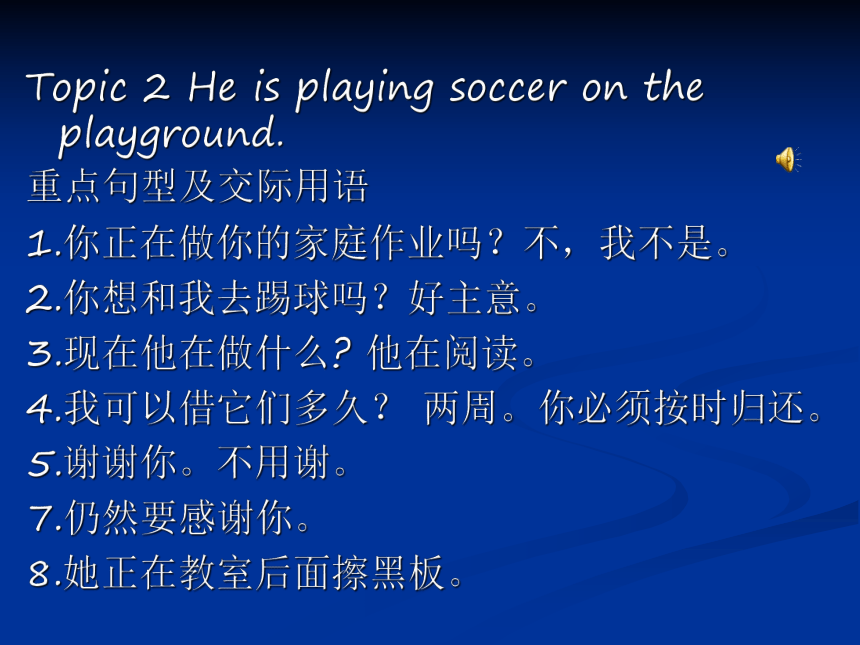
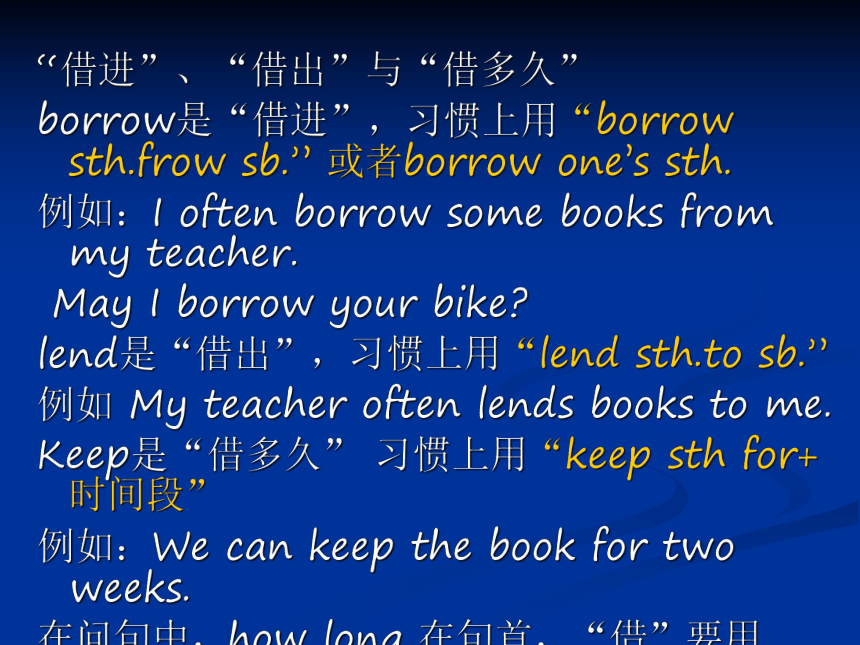
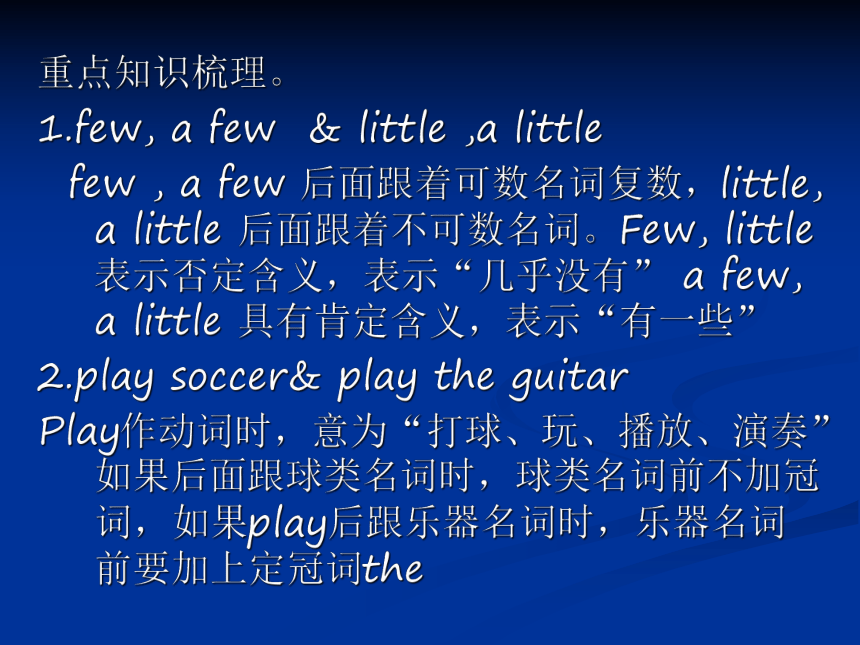
文档简介
(共44张PPT)
期中复习
Unit 5&Unit 6.
Topic 1How do you usually come to school
学习目标
1.掌握有关表达交通方式的句型(两种互换、如何提问)
2.掌握有关频度副词的使用方法。(六个、若干频度短语、如何提问)
3.掌握一般现在时的用法(动词形式、变问句、否定句)
4.能够简单描述日常生活。(动词短语及时间表达)
频度副词
从频度最高到最低
1. 2. 3. 4. 5. 6. .
频度短语
1.每天 2. 每天早上 .
3.一周一次 . 4.一周俩次 .
5.一周三次 . 5.很经常 .
对频度副词和频度短语提问要用 .
习惯用语
1.在学校门口 2.对…也一样 3.来到某地
4.乘地铁、飞机、轮船 5.步行 6.在平日
7.乘坐公交车 8.乘地铁 9.骑自行车
10.了解 11.步行到… 12.很少学生
13.外出吃饭 14.稍稍休息 15. 结束
16.去游泳 17.打篮球、 18.多久一次
18.一周一次 19.一会儿 20.与…不同
重点句型
1.新年快乐!你也一样!
2.你通常怎样到校?我通常坐地铁到校。
3.该上课了。(两种方法)
4.早起的鸟儿有虫吃。
5.我想了解关于美国学生的学校生活。
6.他们在学校上学期间很少外出吃饭。
7.海清通常放学后做什么?
8.你多就去一次图书馆?一周一次、一周两次、一周三次、很经常、天天、很少、从来没有。
9.工作第一。
同义句练习
1.Maria sometimes goes home by subway.
Maria sometimes 。
2.Li Xiang often comes to school by bike.
Li Xiang often .
3.We usually go to the park on foot.
We usually .
4.They always go to the zoo by bus.
They always .
5.He always goes to work by car.
He always .
6.It is time for class. It is time .
3.”看”的译法
“看书 、看报”用read.
“看电视、看比赛”用watch
“看见”用see,强调“看”的结果
“看”的动作, 用look.
4. go swimming \go fishing\go shopping
“go+v.ing” 是一种习惯用语,表示“去做某事”
Topic 2He is playing soccer on the playground.
学习目标
1.能够准确表达有关学校建筑物的名称。
2.能够表达如何借物。
3.能够写出简单的新闻和海报。
4.掌握现在进行时的用法。(用法、构成、标志词、变问句、变否定句)
习惯用语
1.做卡片 2.在图书馆 3.在操场上
4.在体育馆 5.此刻 6.在教学楼
7.一些 8.在某方面做得更好
9.寻找 10.在书架上 11.把某物还给...
12.准时 13.失物招领处 14.带领某人参观
15.举行一场足球赛 16.倾听
17.在游泳池里 18.在教室后面 19.与…谈话
20.在长城上 21.某一天
Topic 2 He is playing soccer on the playground.
重点句型及交际用语
1.你正在做你的家庭作业吗?不,我不是。
2.你想和我去踢球吗?好主意。
3.现在他在做什么 他在阅读。
4.我可以借它们多久? 两周。你必须按时归还。
5.谢谢你。不用谢。
7.仍然要感谢你。
8.她正在教室后面擦黑板。
“借进”、“借出”与“借多久”
borrow是“借进”,习惯上用“borrow sth.frow sb.” 或者borrow one’s sth.
例如:I often borrow some books from my teacher.
May I borrow your bike
lend是“借出”,习惯上用“lend sth.to sb.”
例如 My teacher often lends books to me.
Keep是“借多久” 习惯上用“keep sth for+时间段”
例如:We can keep the book for two weeks.
在问句中,how long 在句首,“借”要用“keep”
重点知识梳理。
1.few, a few & little ,a little
few , a few 后面跟着可数名词复数,little, a little 后面跟着不可数名词。Few, little 表示否定含义,表示“几乎没有” a few, a little 具有肯定含义,表示“有一些”
2.play soccer& play the guitar
Play作动词时,意为“打球、玩、播放、演奏”如果后面跟球类名词时,球类名词前不加冠词,如果play后跟乐器名词时,乐器名词前要加上定冠词the
return的双重含义:归还&返回
当”归还“ 讲时,等于 “give back”
例如:You must return the book to the library on time.=You must give back the book to the library.
当 “返回”讲时等于”come back” “return to”表示 “回到某处”“return from”表示”从某处回来“
例如:He will return to China next week.
He will return from England next week.
Else& other的 用法
else意为“别的,其他的”放在疑问代词、疑问副词或不定代词后面。
如:What else do you want to say
Who else go there with you
Where else can you see the sign
There is nothing else left on the plate.
Is there anyone else in the classroom
“也“有不同:also,too,either,as well
also,too,either,as well 都是 “也” ,但各有各的用法。
1.also表示”也“通常用于肯定句,放在实义动词前,be动词、情态动词后
如:I also want to visit it one day.
I am from China,he is also from China.
I can speak English, she can also speak English.
2.too用于肯定句句末,常用逗号隔开。
I am a student, he is a student, too.
3.either用于否定句句末,常用逗号隔开。
I don’t like appples, he doesn’t like apples, either.
4.as well 一般用于肯定句句末,但没有逗号隔开。
She can drive a car as well.
一般现在时 现在进行时
用法 表示经常发生的动作。
I usually get up at 6:30.
表示现在存在的状态。
My father is a teacher
客观真理,自然现象。
The sun rises(升起) in the east. 1.表示说话时(此刻)正在发生地动作。
He is writing a letter in the study.
2.表示现阶段正在发生或进行的动作。
I am studing in No. 4 Junior High School.
3.表示即将发生的动作。
I’m coming .
动词形式 be动词(am\is\are)
He is a worker.
实义动词(原型、单三)
He usually goes to school on foot.
I always do my homework after supper.
情态动词加实义动词.
I can speak a little English. Be(am\is\are)+V.ing
I am listening to music.
He is watching TV.
They are talking about a film.
时间状语 Always,usually,often,sometimes,seldom,
never,every day,every week,in the morning,once a week now, at the moment.
以 look, listen 开头的句子。
Topic 3 My school life is very interesting.
1.掌握有关星期和学科的名词。
2.能用英语表达校园生活
3.能用英语表达兴趣、喜欢、不喜欢。
4.掌握英文书信的书写格式。
习惯用语
1.上音乐课 2.课外活动 3.多少
4.每周 5.在星期三 6.了解过去
7.演算数学题 8.看书 9.认为
10.对某人友好 11.一些别的科目 12.在意
13.从…学习到很多
重点句型
1.-今天星期几? 今天星期三。
2.-他们在上什么课?他们在上音乐课。
3.-这节课什么时候开始?-在十点钟
4.每一天他上多少节课?
5.你一定很喜欢英语
6.-你认为它怎们样?-有时候它难且乏味,因此我不太喜欢它。
7.-你最喜欢什么科目?-我最喜欢历史。
8.-为什么你喜欢它?-因为它容易且有趣。
9.我的老师们对我很友好。
10.我可以从它上面学到许多。
11.谢谢你的辛勤工作。
同义句转换
1.What do you think of it
do you it
2.What’s your favorite subjiect
What subjiect you like
3.Why don’t you play soccer with me
play soccer with me
4.Thank you for your help.
Thank you for .
对划线部分提问
1.I want to work in China because I love China.
you want to work in China
2.It’s Thursday today.
is it today
3The class is over at 11:00.
the class over
4We are having an English class.
. are you having
5.They have seven classes every day.
. Classes do they have every day
Unit 6 Topic 1 Is there a computer in your study
学习目标
1.熟练掌握there be 句型的陈述句、一般疑问句、及其答语;
2.掌握“What’s+介词短语?”句型及其答语;掌握“How many…are there+介词短语?”句型及其答语;
3.能够准确使用介词来描述人或物的位置。
习惯用语
1在二楼 2.在…近旁 3.来楼上
4.看一看 5.进来 6.如此多的书
7.在…前面 8.餐厅 9.客厅
11.在花园里 12.和…玩 13.把…放好
14.照看,保管 15.在树上 16.在…中心
17.收到…的来信
重点句型
1.欢迎来到我的新家。
2.-你的书房在哪里?-它在二楼,挨着我的卧室。
3.-你的书房有电脑吗?-是的,有。
4.请进。
5.-书房有一些书吗?-是,有的。
6.-书桌上是什么?-有一站等、一台电脑、一些书等等
7.别把它们放在这里,把它们收起来。
8.你得保管好你的物品。
9.-有多少架飞机?-有三架。
对划线部分提问
1.My study is on the second floor.
. is your study
2.There are some flowers in the garden.
. in the garden
3.There is an apple on the table.
. Apples there on the table
变为一般疑问句
1.There are some newspapers on the chair.
. there newspapers on the chair
2.I usually go to school by bike.
. you usually to school by bike
3.Michael often plays soccer after school.
. Michael often soccer after school.
4.He is playing soccer now.
. he soccer now
变为否定句
1.There are some newspaper on the chair.
.There newspaper on the chair.
2.I usually go to school on foot.
I usually go to school on foot.
3.He visits his grandparents every Sunday.
He his grandparents every Sunday.
4.He is doing his omework now.
He doing his homework now.
5.Open your books.
. open your books.
1.What does he do in the evening (用现在进行时改写)
What he now
2.Jane has an English class every day (用now改写)
Jane an English class .
Topic 2 What’s your home like
学习目标
1.继续学习there be 句型,并能熟练应用;
2.了解不同房屋的类型,能够写出简短的求租、招租广告。
3.能够描述社区中不同建筑物的位置关系;学会正确处理邻里关系及向社区求助。
Topic 3Which is the way to the post office
学习目标
1.掌握有关问路、指路等一些常见句型和习惯用语;学习并掌握由介词across,between等构成的短语;
2.理解before, when ,until引导的时间状语从句;掌握情态动词must的用法;
3.了解交通标志的含义及交通安全知识;
4.掌握祈使句的用法。
同义句练习
1.I like English best.English is .
2.There is something wrong with my watch.
My watch .
3.What is wrong with you
What is with you
4.Turn left at the first street.
Take the first street .
5.Excuse me, which is the way to the bookstore
Excuse me, how can I the bookstore
6.There are no houses near the garden.
There houses near the garden.
对划线部分提问。
1.I always get up at 6:00。
2. He usually goes to school on foot.
3.They often have lunch at school.
4.The dining hall is at the back of the school.
4.Maria goes to the library once a week.
5.He seldom goes to the library.
6.He looks happy because he loves swimming.
7.There is a desk near the shelf.
8.You can keep the book for two weeks.
9.It is 10 kilometers away from here.
10.My home is 2 kilometers away from here.
11.There are 59 students in our class.
12.There is an apple on the table.
13.Our school is big and beautiful.
14.Maria is reading in the library.
15.He goes home per year.
Jane’s Day
Jane often gets up at 6:30 every day.She has breakfast with her parents at 7:00.She usually goes to school on foot.Classes always begin at 8:00.She usually has lunch at school at about 12:00.She often gets home at 6:00p.m and has dinner at 7:30 p.m.
6:30p.m. in the evening
It’s 6:30 in the evening now.My family are very busy now. My father is reading a book and my mother is making the dinner for us. My brother and I are doing our homework. Where’s my sister Oh, look, she is watching TV in the living room
My school life
My school life is very interesting(总述). We always begin classes at 8:00a.m, and we have four classes in the morning and two classes in the afternoon. We have many subjects .They are English, math, history,Chinese and so on. I like history best because it’s easy and interesting. (学习)
School is over at 4:30 P.m.After school we can play sports on the playground. We can sing and dance in the gym, we can also go to the library to read .(活动)
I like my school life very much.(总结)
Asking the way and showing the way
Tom: Excuse me, can you tell me the way to the museum
Policeman: Walk along this street, turn right at the second street. The museum is about 2 hundred meters along on the left.
Tom: Do I need to take a bus Which bus can I take
Policeman: You can take No.2 bus or you can walk there, It’s not far.
Tom: Thank you very much.
Policeman: You’re welcome.
School rules
1.Don’t listen to music in the classroom.
2.You have to wear sports shoes for P.E.class.
3.Don’t eat in the classroom.
4.Keep quiet in class.
5.Listen to your teachers carefully in class.
6.Do your homework alone.
WANTED
An apartment with funiture for a family of four, under ¥900 per month.Please call Mr.King at 8989-6678.
FOR RENT
现在进行时态中“V+ing”的规则。
1.直接加-ing
do-doing, speak-speaking,
talk-talking, play- playing
2.以不发音的字母e结尾的动词,去掉字母e后再加-ing
make-making, have-having, leave-leaving ,
come-coming, write-writing, take-taking
3.以一个辅音结尾的重读闭音节,双写尾字母再加-ing
run-running , sit- sitting, shop-shopping
swim-swimming, begin-beginning
4.以ie结尾的动词,先把ie变为y,然后再加-ing。
die(死)-dying, lie(躺)-lying
你好,绿色社区服务中心,需要效劳吗?
你好,我是林达在讲话。我住在A座606号公寓。
奥,怎么了?
我的厨房风扇坏了。
对不起,我听不见。线路不好。
我的厨房风扇坏了。
好的。我会叫人去修理的。
多谢。
不客气。A座606公寓,对吗?
对。
1.-What does Michael do after school
-He plays (play) basketball every day.
2.My daughter likes going swimming (swim)
3.-How about watching (watch) TV
4.Here is a birthday card for you with our best wishes (wish)
5.I will take a photo of you when you are dancing (dance)
6.Please be careful (care)when you go across the street.
7.-What’s on the table
-There is (be)much meat on the table.
8.The teacher’s office is on the third (three) floor.
9.He is always friendly (friend) to me.
10. It’s good to help children and old people cross (across) the road.
期中复习
Unit 5&Unit 6.
Topic 1How do you usually come to school
学习目标
1.掌握有关表达交通方式的句型(两种互换、如何提问)
2.掌握有关频度副词的使用方法。(六个、若干频度短语、如何提问)
3.掌握一般现在时的用法(动词形式、变问句、否定句)
4.能够简单描述日常生活。(动词短语及时间表达)
频度副词
从频度最高到最低
1. 2. 3. 4. 5. 6. .
频度短语
1.每天 2. 每天早上 .
3.一周一次 . 4.一周俩次 .
5.一周三次 . 5.很经常 .
对频度副词和频度短语提问要用 .
习惯用语
1.在学校门口 2.对…也一样 3.来到某地
4.乘地铁、飞机、轮船 5.步行 6.在平日
7.乘坐公交车 8.乘地铁 9.骑自行车
10.了解 11.步行到… 12.很少学生
13.外出吃饭 14.稍稍休息 15. 结束
16.去游泳 17.打篮球、 18.多久一次
18.一周一次 19.一会儿 20.与…不同
重点句型
1.新年快乐!你也一样!
2.你通常怎样到校?我通常坐地铁到校。
3.该上课了。(两种方法)
4.早起的鸟儿有虫吃。
5.我想了解关于美国学生的学校生活。
6.他们在学校上学期间很少外出吃饭。
7.海清通常放学后做什么?
8.你多就去一次图书馆?一周一次、一周两次、一周三次、很经常、天天、很少、从来没有。
9.工作第一。
同义句练习
1.Maria sometimes goes home by subway.
Maria sometimes 。
2.Li Xiang often comes to school by bike.
Li Xiang often .
3.We usually go to the park on foot.
We usually .
4.They always go to the zoo by bus.
They always .
5.He always goes to work by car.
He always .
6.It is time for class. It is time .
3.”看”的译法
“看书 、看报”用read.
“看电视、看比赛”用watch
“看见”用see,强调“看”的结果
“看”的动作, 用look.
4. go swimming \go fishing\go shopping
“go+v.ing” 是一种习惯用语,表示“去做某事”
Topic 2He is playing soccer on the playground.
学习目标
1.能够准确表达有关学校建筑物的名称。
2.能够表达如何借物。
3.能够写出简单的新闻和海报。
4.掌握现在进行时的用法。(用法、构成、标志词、变问句、变否定句)
习惯用语
1.做卡片 2.在图书馆 3.在操场上
4.在体育馆 5.此刻 6.在教学楼
7.一些 8.在某方面做得更好
9.寻找 10.在书架上 11.把某物还给...
12.准时 13.失物招领处 14.带领某人参观
15.举行一场足球赛 16.倾听
17.在游泳池里 18.在教室后面 19.与…谈话
20.在长城上 21.某一天
Topic 2 He is playing soccer on the playground.
重点句型及交际用语
1.你正在做你的家庭作业吗?不,我不是。
2.你想和我去踢球吗?好主意。
3.现在他在做什么 他在阅读。
4.我可以借它们多久? 两周。你必须按时归还。
5.谢谢你。不用谢。
7.仍然要感谢你。
8.她正在教室后面擦黑板。
“借进”、“借出”与“借多久”
borrow是“借进”,习惯上用“borrow sth.frow sb.” 或者borrow one’s sth.
例如:I often borrow some books from my teacher.
May I borrow your bike
lend是“借出”,习惯上用“lend sth.to sb.”
例如 My teacher often lends books to me.
Keep是“借多久” 习惯上用“keep sth for+时间段”
例如:We can keep the book for two weeks.
在问句中,how long 在句首,“借”要用“keep”
重点知识梳理。
1.few, a few & little ,a little
few , a few 后面跟着可数名词复数,little, a little 后面跟着不可数名词。Few, little 表示否定含义,表示“几乎没有” a few, a little 具有肯定含义,表示“有一些”
2.play soccer& play the guitar
Play作动词时,意为“打球、玩、播放、演奏”如果后面跟球类名词时,球类名词前不加冠词,如果play后跟乐器名词时,乐器名词前要加上定冠词the
return的双重含义:归还&返回
当”归还“ 讲时,等于 “give back”
例如:You must return the book to the library on time.=You must give back the book to the library.
当 “返回”讲时等于”come back” “return to”表示 “回到某处”“return from”表示”从某处回来“
例如:He will return to China next week.
He will return from England next week.
Else& other的 用法
else意为“别的,其他的”放在疑问代词、疑问副词或不定代词后面。
如:What else do you want to say
Who else go there with you
Where else can you see the sign
There is nothing else left on the plate.
Is there anyone else in the classroom
“也“有不同:also,too,either,as well
also,too,either,as well 都是 “也” ,但各有各的用法。
1.also表示”也“通常用于肯定句,放在实义动词前,be动词、情态动词后
如:I also want to visit it one day.
I am from China,he is also from China.
I can speak English, she can also speak English.
2.too用于肯定句句末,常用逗号隔开。
I am a student, he is a student, too.
3.either用于否定句句末,常用逗号隔开。
I don’t like appples, he doesn’t like apples, either.
4.as well 一般用于肯定句句末,但没有逗号隔开。
She can drive a car as well.
一般现在时 现在进行时
用法 表示经常发生的动作。
I usually get up at 6:30.
表示现在存在的状态。
My father is a teacher
客观真理,自然现象。
The sun rises(升起) in the east. 1.表示说话时(此刻)正在发生地动作。
He is writing a letter in the study.
2.表示现阶段正在发生或进行的动作。
I am studing in No. 4 Junior High School.
3.表示即将发生的动作。
I’m coming .
动词形式 be动词(am\is\are)
He is a worker.
实义动词(原型、单三)
He usually goes to school on foot.
I always do my homework after supper.
情态动词加实义动词.
I can speak a little English. Be(am\is\are)+V.ing
I am listening to music.
He is watching TV.
They are talking about a film.
时间状语 Always,usually,often,sometimes,seldom,
never,every day,every week,in the morning,once a week now, at the moment.
以 look, listen 开头的句子。
Topic 3 My school life is very interesting.
1.掌握有关星期和学科的名词。
2.能用英语表达校园生活
3.能用英语表达兴趣、喜欢、不喜欢。
4.掌握英文书信的书写格式。
习惯用语
1.上音乐课 2.课外活动 3.多少
4.每周 5.在星期三 6.了解过去
7.演算数学题 8.看书 9.认为
10.对某人友好 11.一些别的科目 12.在意
13.从…学习到很多
重点句型
1.-今天星期几? 今天星期三。
2.-他们在上什么课?他们在上音乐课。
3.-这节课什么时候开始?-在十点钟
4.每一天他上多少节课?
5.你一定很喜欢英语
6.-你认为它怎们样?-有时候它难且乏味,因此我不太喜欢它。
7.-你最喜欢什么科目?-我最喜欢历史。
8.-为什么你喜欢它?-因为它容易且有趣。
9.我的老师们对我很友好。
10.我可以从它上面学到许多。
11.谢谢你的辛勤工作。
同义句转换
1.What do you think of it
do you it
2.What’s your favorite subjiect
What subjiect you like
3.Why don’t you play soccer with me
play soccer with me
4.Thank you for your help.
Thank you for .
对划线部分提问
1.I want to work in China because I love China.
you want to work in China
2.It’s Thursday today.
is it today
3The class is over at 11:00.
the class over
4We are having an English class.
. are you having
5.They have seven classes every day.
. Classes do they have every day
Unit 6 Topic 1 Is there a computer in your study
学习目标
1.熟练掌握there be 句型的陈述句、一般疑问句、及其答语;
2.掌握“What’s+介词短语?”句型及其答语;掌握“How many…are there+介词短语?”句型及其答语;
3.能够准确使用介词来描述人或物的位置。
习惯用语
1在二楼 2.在…近旁 3.来楼上
4.看一看 5.进来 6.如此多的书
7.在…前面 8.餐厅 9.客厅
11.在花园里 12.和…玩 13.把…放好
14.照看,保管 15.在树上 16.在…中心
17.收到…的来信
重点句型
1.欢迎来到我的新家。
2.-你的书房在哪里?-它在二楼,挨着我的卧室。
3.-你的书房有电脑吗?-是的,有。
4.请进。
5.-书房有一些书吗?-是,有的。
6.-书桌上是什么?-有一站等、一台电脑、一些书等等
7.别把它们放在这里,把它们收起来。
8.你得保管好你的物品。
9.-有多少架飞机?-有三架。
对划线部分提问
1.My study is on the second floor.
. is your study
2.There are some flowers in the garden.
. in the garden
3.There is an apple on the table.
. Apples there on the table
变为一般疑问句
1.There are some newspapers on the chair.
. there newspapers on the chair
2.I usually go to school by bike.
. you usually to school by bike
3.Michael often plays soccer after school.
. Michael often soccer after school.
4.He is playing soccer now.
. he soccer now
变为否定句
1.There are some newspaper on the chair.
.There newspaper on the chair.
2.I usually go to school on foot.
I usually go to school on foot.
3.He visits his grandparents every Sunday.
He his grandparents every Sunday.
4.He is doing his omework now.
He doing his homework now.
5.Open your books.
. open your books.
1.What does he do in the evening (用现在进行时改写)
What he now
2.Jane has an English class every day (用now改写)
Jane an English class .
Topic 2 What’s your home like
学习目标
1.继续学习there be 句型,并能熟练应用;
2.了解不同房屋的类型,能够写出简短的求租、招租广告。
3.能够描述社区中不同建筑物的位置关系;学会正确处理邻里关系及向社区求助。
Topic 3Which is the way to the post office
学习目标
1.掌握有关问路、指路等一些常见句型和习惯用语;学习并掌握由介词across,between等构成的短语;
2.理解before, when ,until引导的时间状语从句;掌握情态动词must的用法;
3.了解交通标志的含义及交通安全知识;
4.掌握祈使句的用法。
同义句练习
1.I like English best.English is .
2.There is something wrong with my watch.
My watch .
3.What is wrong with you
What is with you
4.Turn left at the first street.
Take the first street .
5.Excuse me, which is the way to the bookstore
Excuse me, how can I the bookstore
6.There are no houses near the garden.
There houses near the garden.
对划线部分提问。
1.I always get up at 6:00。
2. He usually goes to school on foot.
3.They often have lunch at school.
4.The dining hall is at the back of the school.
4.Maria goes to the library once a week.
5.He seldom goes to the library.
6.He looks happy because he loves swimming.
7.There is a desk near the shelf.
8.You can keep the book for two weeks.
9.It is 10 kilometers away from here.
10.My home is 2 kilometers away from here.
11.There are 59 students in our class.
12.There is an apple on the table.
13.Our school is big and beautiful.
14.Maria is reading in the library.
15.He goes home per year.
Jane’s Day
Jane often gets up at 6:30 every day.She has breakfast with her parents at 7:00.She usually goes to school on foot.Classes always begin at 8:00.She usually has lunch at school at about 12:00.She often gets home at 6:00p.m and has dinner at 7:30 p.m.
6:30p.m. in the evening
It’s 6:30 in the evening now.My family are very busy now. My father is reading a book and my mother is making the dinner for us. My brother and I are doing our homework. Where’s my sister Oh, look, she is watching TV in the living room
My school life
My school life is very interesting(总述). We always begin classes at 8:00a.m, and we have four classes in the morning and two classes in the afternoon. We have many subjects .They are English, math, history,Chinese and so on. I like history best because it’s easy and interesting. (学习)
School is over at 4:30 P.m.After school we can play sports on the playground. We can sing and dance in the gym, we can also go to the library to read .(活动)
I like my school life very much.(总结)
Asking the way and showing the way
Tom: Excuse me, can you tell me the way to the museum
Policeman: Walk along this street, turn right at the second street. The museum is about 2 hundred meters along on the left.
Tom: Do I need to take a bus Which bus can I take
Policeman: You can take No.2 bus or you can walk there, It’s not far.
Tom: Thank you very much.
Policeman: You’re welcome.
School rules
1.Don’t listen to music in the classroom.
2.You have to wear sports shoes for P.E.class.
3.Don’t eat in the classroom.
4.Keep quiet in class.
5.Listen to your teachers carefully in class.
6.Do your homework alone.
WANTED
An apartment with funiture for a family of four, under ¥900 per month.Please call Mr.King at 8989-6678.
FOR RENT
现在进行时态中“V+ing”的规则。
1.直接加-ing
do-doing, speak-speaking,
talk-talking, play- playing
2.以不发音的字母e结尾的动词,去掉字母e后再加-ing
make-making, have-having, leave-leaving ,
come-coming, write-writing, take-taking
3.以一个辅音结尾的重读闭音节,双写尾字母再加-ing
run-running , sit- sitting, shop-shopping
swim-swimming, begin-beginning
4.以ie结尾的动词,先把ie变为y,然后再加-ing。
die(死)-dying, lie(躺)-lying
你好,绿色社区服务中心,需要效劳吗?
你好,我是林达在讲话。我住在A座606号公寓。
奥,怎么了?
我的厨房风扇坏了。
对不起,我听不见。线路不好。
我的厨房风扇坏了。
好的。我会叫人去修理的。
多谢。
不客气。A座606公寓,对吗?
对。
1.-What does Michael do after school
-He plays (play) basketball every day.
2.My daughter likes going swimming (swim)
3.-How about watching (watch) TV
4.Here is a birthday card for you with our best wishes (wish)
5.I will take a photo of you when you are dancing (dance)
6.Please be careful (care)when you go across the street.
7.-What’s on the table
-There is (be)much meat on the table.
8.The teacher’s office is on the third (three) floor.
9.He is always friendly (friend) to me.
10. It’s good to help children and old people cross (across) the road.
同课章节目录
- Unit 5 Our school life
- Topic 1 I usually come to school by subway.
- Topic 2 A few students are running around the play
- Topic 3 My school life is very interesting.
- Unit 6 Our local area
- Topic 1 Is there a computer in your study?
- Topic 2 My home is in an apartment building.
- Topic 3 Which is the way to the hospital?
- Review of Units 5-6
- Unit 7 The Birthday
- Topic 1 When is your birthday?
- Topic 2 Can you sing an English song?
- Topic 3 Everyone had a good time.
- Unit 8 The seasons and the Weathe
- Topic 1 What's the weather like in summer?
- Topic 2 The summer holidays are coming.
- Topic 3 Let’s celebrate!
- Review of Units 7-8
- 旧版资料
- Unit 5 Our School Life
- Unit 6 Our Local Area
- Unit 7 The Birthday
- Unit 8 The seasons and the Weathe
- Unit 7 Celebrating the Birthday(老版本)
